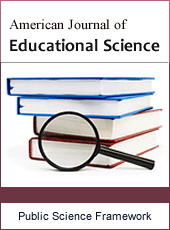American Journal of Educational Science
Articles Information
American Journal of Educational Science, Vol.1, No.1, Mar. 2015, Pub. Date: Mar. 5, 2015
Do Local Trainee Pilots of UAE Suffer from More Stress than their Counterpart International Students: Case of an UAE Airline
Pages: 1-6 Views: 5582 Downloads: 1338
[01]
Arif Sikander, School of Management and Governance, Murdoch University, Perth, Western Australia.
Many previous studies have analysed the level of task and relationship orientation of different cultures and their affect on stress (Sikander, Mujtaba and Akhtar 2012). Although Stress is quite normal at workplace and influences the level of performance of individuals, however, it becomes much more important when sensitive professions like Flying have to be analysed. Cultural differences of students perhaps could influence the stress perception. There is dearth of studies in this area. The sample for the study included students undergoing aviation courses as sponsored and self-paid and to analyse the various relationships. It was expected that the difference in results will be a contribution to the literature and will also provide useful input to design the courses for aviation students belonging to different cultures. This study focused on the differences of 40 Emiratis and 20 non-Emiratis (expat) aviation students. It appears that the expat students focused more on task orientation then relationships. They also had higher level of stress scores from work overload. In this paper, literature on the country of survey, stress influence on flying and workload of pilots and recommendations for subsequent research is included.
Aviation, Stress, UAE, Pilots, Task
[01]
Afza, T., Mujtaba, B. G., and Habib, N. (March 2011). Stress Perceptions of Working Adult Emiratis and Americans. International Journal of Business and Social Science, 2(5), 32-40. Website: http://ijbssnet.com/archive/220.html
[02]
Burstein, D. D. (2013). Fast Future: How the Millennial Generation Is Shaping Our World. Beacon Press.
[03]
Cone, Inc & AMP Insights. (2006). Millennial Cause Study.
[04]
Davis, S. M. (1990). Managing Corporate Culture. Harper & Row.
[05]
DFAT (2014). https://www.dfat.gov.au/geo/uae/uae_country_brief.html Mar2014.
[06]
Furlong, A. (2013). Youth Studies: An Introduction. New York: Routledge.
[07]
Hall, E. T. (1976). Beyond culture. New York: Anchor Books.
[08]
Howe, N., & Strauss, W. (1992). Generations: The History of America's Future, 1584 to 2069. HarperCollins.
[09]
Huang, Kuo-Ying & Mujtaba, Bahaudin G. (2010). Stress, Task, and Relationship Orientations of Taiwanese Adults: An Examination of Gender in this High-Context Culture. Journal of International Business and Cultural Studies, 3, 1-13.
[10]
Hyde, D., & Allen, R. (1996). Investigations in stress control (4th ed.). Boston, MA: Pearson Custom Publishing.
[11]
Iqbal, A. & Kokash, H. (2011). Faculty Perception of Stress and Coping Strategies in a Saudi Private University: An Exploratory Study. International Education Studies, 4(3), 137-149.
[12]
Kagitcibasi, C., (1994). Individualism and Collectivism. IN Kim, U., H. Triandis, C.
[13]
Maignan, I., Ferrell, O. C., & Ferrell, L. (2005). A stakeholder model for implementing social responsibility in marketing. European Journal of Marketing, 956-977.
[14]
Mujtaba, Bahaudin G. (2010). An Examination Of Bahamian Respondents' Task And Relationship Orientations: Do Males Have A Significantly Different Score Than Females? Journal of Diversity Management, 5(3), 35-41.
[15]
Mujtaba, Bahaudin G. (2008). Task and Relationship Orientations of Thai and American Business Students' based on Cultural Contexts. Research in Higher Education Journal, 1(1), 38-57.
[16]
Mujtaba, B. G., Afza, T., and Habib, N. (May 2011). Leadership Tendencies of Emiratis: Exploring Similarities and Differences based on Age and Gender. Journal of Economics and Behavioural Studies, 2(5), 199-212.
[17]
Mujtaba, Bahaudin G & Alsua, Carlos J. (2011). Task and relationship orientation of Americans: a study of gender, age, and work experience. Journal of Behavioural Studies in Business, 3, 1-12.
[18]
Mujtaba, B. G., & Balboa, A. (2009). Comparing Filipino and American task and relationship orientations. The Journal of Applied Management and Entrepreneurship, 14(2), 3–19.
[19]
Nguyen, Lam D & Mujtaba, Bahaudin G. (2011). Stress, Task, and Relationship Orientations of Vietnamese: An Examination of Gender, Age, and Government Work Experience in the Asian Culture. Competition Forum, 9(2), 235-246.
[20]
Northouse, P. G. (2007). Leadership: Theory and practice (4th ed.). Thousand Oaks, CA: Sage Publications.
[21]
Payment, M. (2008). Millenials: The Emerging Workforce. Career Planning and Adult Development Journal, 24(3), 23-32.
[22]
Rice, P. L. (19920. Stress and health. Pacific Grove, CA: Brooks, Cole Publishing Company.
[23]
Robertson, Michael F; Ruiz, Lorelei E. (2010). Perceptions of Stress among Collegiate Aviation Flight Students. Collegiate Aviation Review, 28(1), 115-126.
[24]
SAI UAE (2014). http://www.saiuae.gov.ae/sites/conference/English/Pages/AboutUAE.aspx
[25]
Salleh, L. M. (2005). High/Low context communication: The Malaysian Malay Style. Proceedings of the 2005 Association for Business Communication Annual Convention.
[26]
Schein, E. H. (2006). Organizational Culture and Leadership (3rd Edition ed.). John Wiley & Sons.
[27]
Sikander, A., Mujtaba, B.G.& Naveed A (2012). Business Ethics of Pakistanis in Islamabad and Lahore: Do Age, Gender and Data Collection Processes Make a Difference? International Journal of Learning & Development 2(3).
[28]
Sikander, A., Mujtaba, B.G.& Afza, T (2012). Stress, Task, and Relationship: Analysis across Two Culturally Diverse Countries. Journal of International Business and Management, 4(2), 33-40. http://www.cscanada.net
[29]
UAE Facts (2014) http://uae.facts.co/uaeinformation.php
[30]
Watkins, H.S., and Liu, R., (1996). Collectivism, individualism and in-group membership: implications for consumer complaining behaviours in multicultural contexts. Journal of International Consumer Marketing, 8 (3/4), 69–96.

ISSN Print: 2381-7127
ISSN Online: 2381-7135
Current Issue:
Vol. 6, Issue 2, June Submit a Manuscript Join Editorial Board Join Reviewer Team
ISSN Online: 2381-7135
Current Issue:
Vol. 6, Issue 2, June Submit a Manuscript Join Editorial Board Join Reviewer Team
| About This Journal |
| All Issues |
| Open Access |
| Indexing |
| Payment Information |
| Author Guidelines |
| Review Process |
| Publication Ethics |
| Editorial Board |
| Peer Reviewers |


